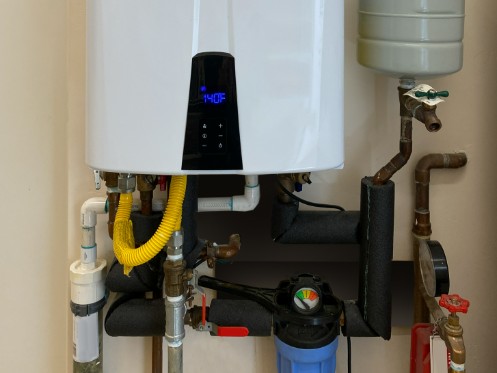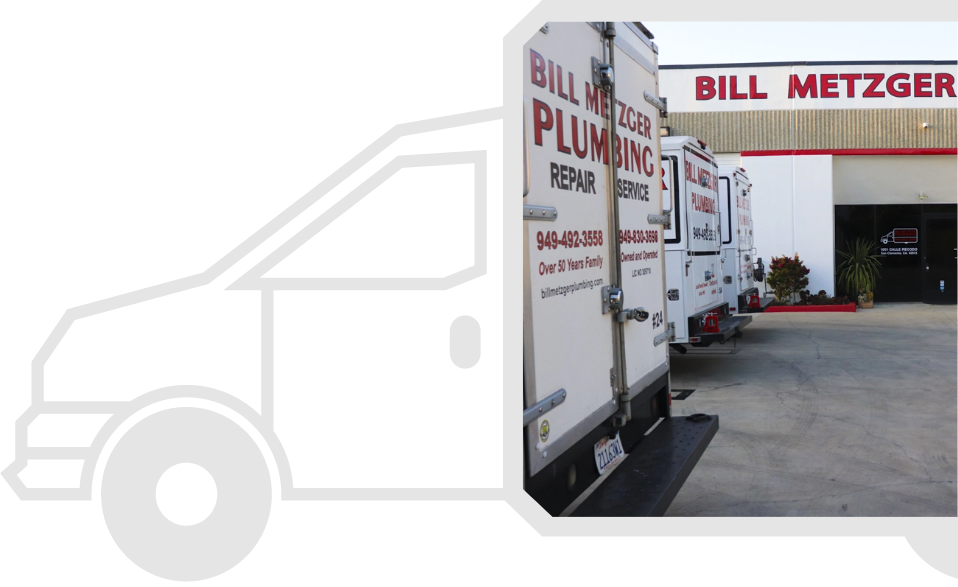If your tank water heater is reaching the end of its life span, replacing it with a tankless water heater can be smart. Before purchasing a tankless water heater for your San Clemente, CA, home, it’s important to carefully consider their pros and cons and learn more about how they operate.
How Tankless Water Heaters Work
A tankless water heater works on demand to quickly provide hot water whenever needed. Instead of storing hot water and occasionally reheating the water inside a tank, tankless water heaters only run when you turn on the hot water at your sink or shower. Whenever hot water is called for, the unit will use gas or electricity to almost instantly heat the water that flows through the unit to the desired temperature. This is done using a metal heat exchanger similar to what is found in a gas furnace.
Gas tankless units have a gas burner that burns natural gas or propane to produce extremely hot combustion fumes. These fumes flow through the heat exchanger, which absorbs most of the heat from the combustion fumes, causing the metal to become extremely hot. The cold water that enters the unit flows over the heat exchanger, and the heat is then transferred from the exchanger into the water to raise the water temperature to whatever the unit is set at.
This process is exactly the same for electric tankless units. The only difference is that these units have an electric resistance coil instead of a gas burner. Electricity flows through the coil, causing it to almost instantly glow and become red hot, and the heat from the resistance coil is then used to make the heat exchanger extremely hot. Both gas and electric units are extremely efficient and can heat the water to the desired temperature in only a few seconds.
Pros of Having a Tankless Water Heater
Having a tankless water heater in your home can provide many advantages. These units are more energy efficient than tank water heaters, so they usually cost less each month to operate. Compared to tank units, they are also more compact, require less space, will never run out of hot water, will last for years, and are low-maintenance.
Energy Efficiency and Operating Cost
Tank water heaters waste energy since they will need to run for several hours every day to ensure the water in the storage tank is always at the correct temperature. Tankless units eliminate this energy waste issue by only running when needed, which makes them quite a bit more energy efficient. Depending on your average daily hot water usage, a tankless water heater will typically use anywhere from 10-40% less energy each month. The total energy savings you’ll get with a tankless unit are always greatest when you’re using 40 gallons or less of hot water in a day. If you often use 80 or more gallons of hot water in a day, a tankless unit will still save you some money but not nearly as much.
Limitless Hot Water Supply
When you have a tank water heater, it is easy to use up your hot water supply quite quickly. This is another area where tankless water heaters are superior since you can leave your hot water running as long as you need without ever running out. The only time you ever could have no hot water is if the power is out as even gas tankless units require electricity to turn on and light the gas burner. If you’re the type of person who likes to take long showers, a tankless unit is a great choice that will let you shower for as long as you want without needing to worry about the water ever going cold.
Long Life Span
Tankless water heaters will also usually last almost twice as long as tank units. The typical life span for a tank unit is usually somewhere around eight to 12 or maybe 15 years at the most, whereas the life span for a tankless unit is usually 20 to even 30 years. When combined with the superior energy efficiency, the longer life span usually makes tankless units the least expensive option in the long term.
Low Maintenance and Fewer Repair Needs
Tankless water heaters also have fewer maintenance requirements simply because they have fewer parts. You should still have a tankless unit inspected every year and also have the unit flushed and descaled to prevent the buildup of mineral deposits, but tankless units are still easier to maintain. The fact that they have fewer parts also means that there is less that can go wrong, so you can also save on repair costs.
Saves Space
Tankless water heaters are a great choice when space is at a premium. This is because tankless units are much more compact and take up far less room than tank units.
Less Chance of Leaks
When you have a tank unit, there is always an increased chance of it leaking as it gets older. This is because the steel tank slowly corrodes and can eventually spring a leak. In some cases, the tank can completely rupture, sending its entire contents rushing out. This is yet another thing you won’t need to ever worry about with a tankless unit. The cold water inlet pipe or hot water outlet can leak, but this still typically won’t be as bad as if a tank unit starts leaking.
Tankless Water Heater Cons
Tankless water heaters do also have a few disadvantages compared to tank units. Namely, they are more expensive to purchase and to install, and they also have a longer lag or wait time and can only supply water to so many fixtures at one time.
Higher Initial Cost
Tankless water heaters typically cost at least $500 more than tank units, which can be an issue if you’re on a tight budget. However, the fact that a tankless unit can last twice as long can definitely save you money over time and more than offset the higher initial cost.
Lag Time
One of the biggest drawbacks to having a tankless unit is that you will need to wait longer before your sink or shower starts putting out hot water. This longer lag time is simply because it takes at least a few seconds from when the unit turns on until the water gets fully hot. Depending on the temperature in your home and how far away your sink or shower is from the water heater, you may need to let the water run for anywhere from 20 seconds to a minute or more before it finally gets hot enough.
Limited Flow Rate
Flow rate measures how many gallons of hot water a tankless unit can provide per minute or per second. Most tankless units have a fairly low flow rate, which means you may not be able to shower and run your dishwasher at the same time. If you try to use hot water in too many fixtures at once, the temperature will usually fluctuate a lot since you’re using more than the unit can supply at once.
Contact Bill Metzger Plumbing Tankless Water Heater Installation
In most cases, the pros of having a tankless water heater replacement definitely outweigh the cons. This isn’t to say a tank unit is a bad choice as it really depends on your budget and your specific hot water needs. Bill Metzger Plumbing offers professional hot water installation services, and our team can help you decide whether a tankless or tank unit is best for your home. Contact us today to learn more about tankless water heaters or if you need any residential plumbing service in San Clemente, CA, or the surrounding areas.



 Today
Today 